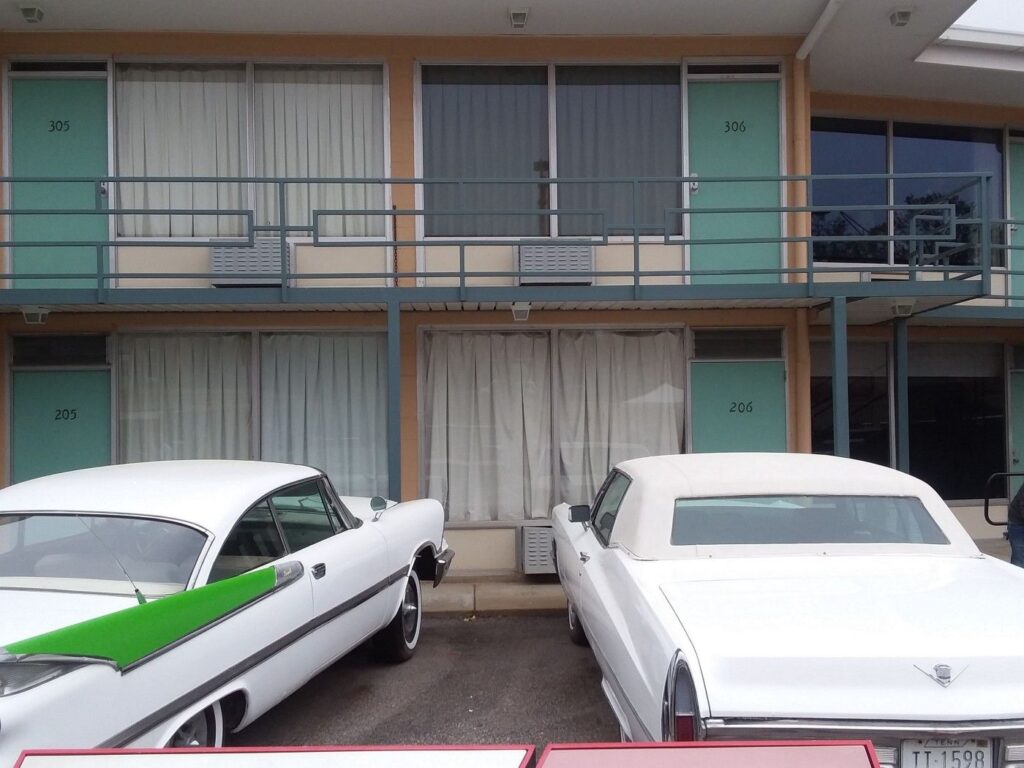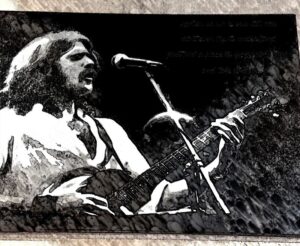
On the road in Memphis, TN – This Peace Log was first published on April 2, 2018.
Today, I went down to the Lorraine Motel for the first time, not far from the Mississippi. I wanted to see the spot where MLK was shot and to see what was happening before the MLK50 Conference begins tomorrow at the Convention Center. As a mobile peace journalist, I drove across country 1,528 miles to get here and cover the event. It’s important to me because of the man — and what he said and did for peace and nonviolence in America. For us all.
On April 3, 1968, when I was seven years old, Martin Luther King gave a speech at the Mason Temple (Church of God in Christ Headquarters) in Memphis the night before he was assassinated. It’s called the “I’ve Been to the Mountaintop” speech. Though I’ve introduced students to his essay “Letter from Birmingham Jail” in nearly every English class I’ve taught (and they always loved it), I’ve enjoyed digging into the Mountaintop tonight… Dr. King sure had a lot to say about peace and activism, and the imperative for every American to stand up for what he or she believes.
Now, Let Us Maintain Unity

In Winslow, Arizona, I wrote about Peace Principle #1: Take It Easy.
Here, in Memphis, Tennessee, right before #MLK50, I bring you Peace Principle #2: Maintain Unity.
As Dr. King, the activist and man of God exhorted us in his Mountaintop speech five decades ago tomorrow:
“We’ve got to stay together and maintain unity. You know, whenever Pharaoh wanted to prolong the period of slavery in Egypt, he had a favorite, favorite formula for doing it. What was that? He kept the slaves fighting among themselves. But whenever the slaves get together, something happens in Pharaoh’s court, and he cannot hold the slaves in slavery. When the slaves get together, that’s the beginning of getting out of slavery. Now let us maintain unity.”
There is so much talk about the races not getting along, about people of different faiths, parties and countries not getting along. There is so much bickering between different points of view. So much attacking — in words and weapons. Dr. King was right. Divisiveness is what keeps us from uniting. Because when we do, there’s no doubt about it, the people will prevail.

War is not good for any of us. It kills, it maims, it separates. The people must stand up in unity and say: We want to be free from war — for our sakes, for our children’s sake and for the generations to follow. That was King’s dream. It is mine, too.
I am convinced that if we all work together to insist on peace as the #1 priority on the planet, other issues like racial inequality, gun violence, immigration, refugees, homelessness, poverty and the like — will follow suit. It’s all connected. Our war culture — and the fear and violence it instills in people — is killing us slowly. MLK warned of this in a big way, saying very emphatically, that we must act:
“Something is happening in our world. The masses of people are rising up. And wherever they are assembled today, whether they are in Johannesburg, South Africa; Nairobi, Kenya; Accra, Ghana; New York City; Atlanta, Georgia; Jackson, Mississippi; or Memphis, Tennessee — the cry is always the same: “We want to be free…
We have been forced to a point where we are going to have to grapple with the problems that men have been trying to grapple with through history, but the demands didn’t force them to do it. Survival demands that we grapple with them.
Men, for years now, have been talking about war and peace. But now, no longer can they just talk about it. It is no longer a choice between violence and nonviolence in this world; it’s nonviolence or nonexistence. That is where we are today.”
Fifty years later, it’s still true that we cannot be free as long as there is perpetual war — and the violence it brings to the battlefield — and to our schools and streets as well. This second peace principle emphasizes the need to focus on what we have in common, on the issues that we can create and “maintain unity” on — and then join together to make them a reality.
But, unlike 1968, we now have the technology to truly unite in a powerful way, both digitally and in person. There is more power in one smartphone now than there was in a huge data center back in 1968. Let’s use #techforgood — for the changes we want to see in our communities and in the world.

After checking out the Civil Rights Museum, I had lunch at a highly-recommended spot: Soul Fish Cafe in Midtown Memphis. The fried green tomatoes and fried okra were delish! While there, I had the opportunity to speak with a young man named David. We talked about many things, including Dr. King, his principles of nonviolence, and also what it will take for the people to unite. I told him a story I had not told anyone before — the story about when I moved into a mostly black neighborhood in Wilmington, NC. in 2011.

I admit, even though I was not prejudiced, I was somewhat fearful at first. But then, as I walked the few blocks from my house to the neighborhood market at night, and interacted with everyone I met, I realized that everyone had my back — and I had theirs. I was not afraid. There was nothing or no one to be afraid of. That was my moment of oneness, of unity — and it changed me forever.
It really is about being able to love everyone and be united with them in brotherhood and sisterhood. The Beatles tune, “All You Need Is Love” may be trite, but it’s true. We are all connected. All attack is self attack. As Dr. King said, when one of us is oppressed, we’re all oppressed.
It was only two years later that I made a personal vow for peace and left on my first peace mission, along with my partner and friend, James, and our dog and friend, Curious George, aka the Monkey Man. I would not know they would both die within a few years. Likewise, that night, back in 1968, Dr. King eerily spoke of his death — and his faith. When a woman or man feels the oneness of all creation, there is no fear. He shared with us that night:
“Well, I don’t know what will happen now. We’ve got some difficult days ahead. But it really doesn’t matter with me now, because I’ve been to the mountaintop. And I don’t mind.
Like anybody, I would like to live a long life. Longevity has its place. But I’m not concerned about that now. I just want to do God’s will. And He’s allowed me to go up to the mountain. And I’ve looked over. And I’ve seen the Promised Land. I may not get there with you. But I want you to know tonight, that we, as a people, will get to the promised land!”
The Promised Land is for us all. It is a world of peace.
Watch Dr. King’s “I’ve Been to the Mountaintop” speech – here.

